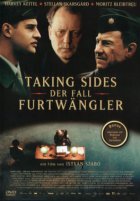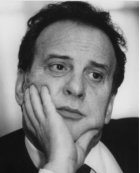
Taking Sides
- NOT RATED
- Year:
- 2001
- 108 min
- 526 Views
FADE IN:
INT. BERLIN CONCERT HALL (1944) - NIGHT
A man conducting Beethoven. Air raid in progress. Bombs
falling nearby. The orchestra continues to play. Suddenly
the lights go out. The music stops.
INT. BACKSTAGE CORRIDOR, CONCERT HALL - NIGHT
A beam from a torch, bouncing, making shadows. An
ATTENDANT, carrying the torch, hurries down the corridor.
The air raid continues.
He comes to a door, knocks, opens it and looks in.
ATTENDANT:
(agitated)
Dr. Furtwängler, the Reichsminister.
The sound of heavy footsteps approaching. The attendant
turns his torch to light the way for three men in Nazi
uniform, also with attendants and torches, marching down
the corridor.
The attendant bows deeply as the REICHSMINISTER and his
aide go through the door. The other man remains in the
corridor on guard.
INT. CONDUCTOR'S ROOM - NIGHT
Candles light the room where the conductor shakes hands
with the Reichsminister.
REICHSMINISTER:
Dr. Furtwängler, I want to apologise
personally for this power failure.
I was so enjoying the performance.
spiritual nourishment.
A bomb explodes nearby.
REICHSMINISTER:
But I welcome this unexpected
opportunity of talking to you.
(with great care)
When you came on to the platform
tonight, I thought you weren't
well. You looked tired,
(a warning)
Get away from this bombing.
Away from the war. Yes, you look
tired...
(a crooked smile)
Even in this light.
INT. RUINED CINEMA - DAY
Dark. ON A SCREEN: scenes from Leni Riefenstahl's triumph
of the will. Over this:
A MAN'S VOICE
Look at them. Men, women, kids.
Boy, did they love him. You see,
Steve, Adolf Hitler touched
something deep, real deep and savage
and barbaric, and it won't just go
away overnight. It's got to be
rooted out. You know what I think?
I think they were all Nazis. And
let's face it, their leaders, those
bastards now on trial in Nuremberg,
couldn't have done it alone. It's
these people, they gave all the
help that was needed. Willingly.
The film changes with a scratchy music soundtrack - Wagner.
SHOTS of high-ranking Nazis in an audience including Josef
Goebbels, listening. And they're listening to and watching
Wilhelm Furtwängler conducting. At the appropriate moment:
THE MAN'S VOICE
That's him. Furtwängler. Wilhelm
Furtwängler.
The Nazis applaud. Goebbels shakes hands with Furtwängler.
The film ends.
Sitting in the ruined cinema are two men: GENERAL WALLACE,
with files on the table, and, beside him, MAJOR STEVE
ARNOLD. A PROJECTIONIST is standing in the door of the
projection room.
WALLACE:
So, you never heard of him.
STEVE:
Nope.
WALLACE:
Do you know who Arturo Toscanini
is?
STEVE:
Sure.
WALLACE:
He's as big as Toscanini, maybe
even bigger. In this neck of the
woods, he's probably Bob Hope and
Betty Grable rolled into one.
STEVE:
Jeez, and I never heard of him.
Wallace glances at the file.
WALLACE:
You were in insurance before the
war.
STEVE:
Right. Claims assessor.
WALLACE:
Conscientious, determined, dogged.
STEVE:
(amused)
They said I was dogged?
WALLACE:
Well, they say here that when you
went on a case, you stayed on it.
(looks up at Steve.)
Now we can't take every Nazi in
this country to trial, although I
would like to; it's an
impossibility. So we're going for
the big boys in industry, education,
law, culture.
STEVE:
Like this bandleader.
WALLACE:
(a smile)
Well, he's more than just a
bandleader, Steve. He's a great
conductor, a gifted artist. But we
believe that he sold himself to
the devil. Your number one priority
from this moment on is to connect
him to the Nazi Party. Don't be
impressed by him. I want the folks
back home to understand why we
fought this war. Find Wilhelm
Furtwängler guilty. He represents
everything that was rotten in
Germany.
Steve wants to rise, but Wallace puts a hand on his shoulder
to make him sit again.
WALLACE:
Stay put, Steve. There is some
other stuff that I'd like for you
to see here. Background.
Translation
Translate and read this script in other languages:
Select another language:
- - Select -
- 简体中文 (Chinese - Simplified)
- 繁體中文 (Chinese - Traditional)
- Español (Spanish)
- Esperanto (Esperanto)
- 日本語 (Japanese)
- Português (Portuguese)
- Deutsch (German)
- العربية (Arabic)
- Français (French)
- Русский (Russian)
- ಕನ್ನಡ (Kannada)
- 한국어 (Korean)
- עברית (Hebrew)
- Gaeilge (Irish)
- Українська (Ukrainian)
- اردو (Urdu)
- Magyar (Hungarian)
- मानक हिन्दी (Hindi)
- Indonesia (Indonesian)
- Italiano (Italian)
- தமிழ் (Tamil)
- Türkçe (Turkish)
- తెలుగు (Telugu)
- ภาษาไทย (Thai)
- Tiếng Việt (Vietnamese)
- Čeština (Czech)
- Polski (Polish)
- Bahasa Indonesia (Indonesian)
- Românește (Romanian)
- Nederlands (Dutch)
- Ελληνικά (Greek)
- Latinum (Latin)
- Svenska (Swedish)
- Dansk (Danish)
- Suomi (Finnish)
- فارسی (Persian)
- ייִדיש (Yiddish)
- հայերեն (Armenian)
- Norsk (Norwegian)
- English (English)
Citation
Use the citation below to add this screenplay to your bibliography:
Style:MLAChicagoAPA
"Taking Sides" Scripts.com. STANDS4 LLC, 2025. Web. 22 Jan. 2025. <https://www.scripts.com/script/taking_sides_403>.






Discuss this script with the community:
Report Comment
We're doing our best to make sure our content is useful, accurate and safe.
If by any chance you spot an inappropriate comment while navigating through our website please use this form to let us know, and we'll take care of it shortly.
Attachment
You need to be logged in to favorite.
Log In